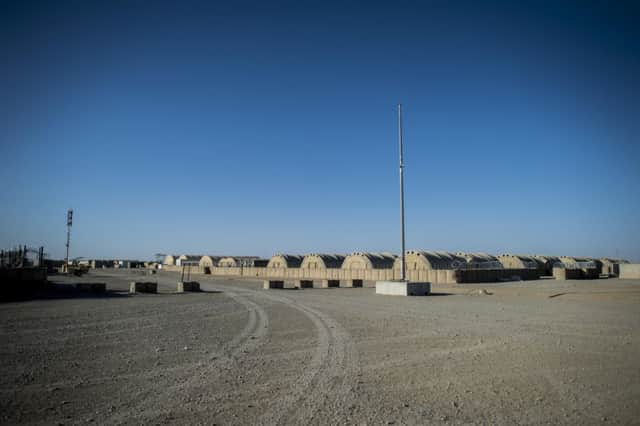Leader: Time to reflect on UK military aims


We remember the courage of the 453 British troops who were killed in this conflict and the grievous loss felt by families. Thousands more were injured or maimed. And after all the ceremonial flag-folding yesterday, 300 UK troops will still remain for a period.
Advertisement
Hide AdAdvertisement
Hide AdEven after so many years the full scale of the UK’s commitment is hard to grasp: a total of 140,000 UK troops served in Afghanistan. Their mission, objectives, deployment, provision and supply was a major preoccupation of public debate and three prime ministers. The overall operational cost is estimated at £19 billion.
Defence Secretary Michael Fallon declared yesterday that “We’re not going to send combat troops back into Afghanistan, under any circumstances.” Resolute though this sounded, it removes neither the troubled legacy of Afghanistan in public consciousness at home nor the residual concern that, despite a 13-year military and political engagement, the country cannot be considered safe from control by Islamic fundamentalists.
At the time Camp Bastion opened, the government said UK forces would be there to protect reconstruction of the country. But that objective soon ran a poor second to military objectives and in particular protecting troops from terrorist attack.
The ultimate question remains: was our commitment worth it? A definitive answer to that must await clarity on what kind of Afghanistan emerges over the coming period. Hopefully it will be a safer and more stable country.
There are positive outcomes to acknowledge. The Taleban, if not defeated, has certainly been contained. The sacrifices of our troops helped to destroy the ability of Islamic terrorists to use the country as a training base and as a launch pad for international attacks. Our military commitment laid the foundations for a strong Afghan security force and created the secure conditions for the first democratic transition of power in the country’s history. But with these accomplishments come searching questions that colour consideration of any future engagement of UK forces. Our troops were ill-equipped and glaring deficiencies were exposed. But the biggest concern of all was the lack of a coherent strategy in the early years.
The overriding lesson learnt from the Afghan experience is to think very carefully about being drawn into such conflict again unless we know exactly what the mission involves, how we intend to pursue it and what the limits are. The Afghanistan mission suffered critically from vagueness at the top over whether it was a set of military objectives or a commitment to nation-building. There are limits to what our now depleted armed forces can achieve – and we have learned the hard way to respect them.
To sum up, maths really does count
Poll evidence reveals parents have problems helping their children with maths. Many struggle with fractions and long division. But then there’s maths… and there’s maths.
It doesn’t take long for adults to work out the effect of an income tax rise on their take-home pay. And it takes even shorter for shoppers to spot an overcharge at the check-out.
Advertisement
Hide AdAdvertisement
Hide AdNow apply this test to children. It would take perhaps the shortest interval in recorded time for a child to spot a 50p reduction in their pocket money. Promise the same child a 10 per cent increase in their pocket money if they can work out the bonus in cash terms and the right answer will fly out very quickly.
The problem with maths is not maths. It’s overcoming the psychological hurdle of relating basic calculations to real time gains and losses. When issues such as tax and benefits are at stake, we can safely say that the voting population is extremely adept in undertaking complex calculations.
These are life survival skills that we pick up quickly in adulthood. For young people such issues can be abstract. But the teaching of maths is a key requirement of education.
Numbers make the world go around – and a sound grip of arithmetic helps us to get on in life. A major responsibility lies with parents in encouraging their children to commit to the subject and persevere. And are parents really so innumerate when it comes down to brass tacks?
You are planning a holiday in Tenerife. The hotel room costs 100 euros a night. If your budget is £500 and £1 buys €1.27, how many nights can you stay? (Clue: the complimentary pina coladas run out after six nights.)